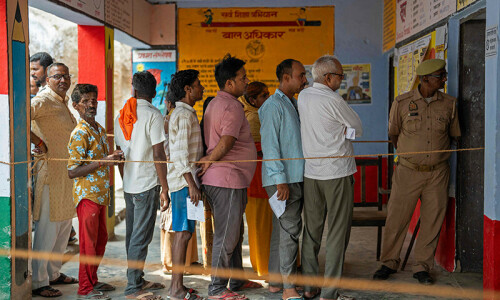ISLAMABAD, Sept 7: The mishandling of the Mumbai attacks case by the Pakistan and Indian governments has not only delayed the trial of the suspects in Pakistan, it may even result in the acquittal of the accused.
Even after a lapse of three years in the trial of the seven suspects in Pakistan, neither the Federal Investigation Agency nor its Indian counterpart has finalised the process of recording witness testimonies.
A letter between the two countries dated Nov 5, 2010 is now being criticised for playing an important role in delaying the trial.
The letter, according to which the Pakistani government accepted the Indian government’s request to exempt the Indian witnesses from cross-examination, has been criticised by the lawyers’ community for being against the Pakistani and Indian penal and criminal-procedure codes.
The Pakistani defence lawyers of the seven suspects — alleged mastermind Zakiur Rehman Lakhvi, Abdul Wajid, Mazhar Iqbal, Hammad Amin Sadiq, Shahid Jameel Riaz, Jamil Ahmed and Younas Anjum — and the Pakistani prosecutors went to India in March to join the proceedings of the commission that had been formed to record witness testimonies.
Soon after their return, however, the defence counsel challenged the proceedings because the Mumbai commission’s presiding officer, S.S. Shinde, did not let them cross-examine witnesses as per the Nov 5 letter. A Pakistani anti-terrorism court (ATC) then declared the proceedings of the Mumbai commission illegal.
Following the court order, the Pakistani government took a U-turn and in July sent a request to the Indian government to allow cross-examination. A reply has not yet been received. According to international-law expert Ahmer Bilal Soofi, the Pakistani and Indian governments wrongly agreed to waive the right of cross-examination because there is no such provision in the laws of either country.
India may have made the request, he says, because lone surviving gunman Ajmal Kasab was under trial in an Indian court at the time and the witnesses could have said something that may have hurt the Indian prosecution’s case.
But since the agreement was not a formal treaty, Mr Soofi says, both countries can set aside the Nov 5 letter with mutual consent.
According to documents available with Dawn, FIA special prosecutor Chaudhry Zulfiqar Ali submitted an application before Mr Shinde during the proceedings of the Mumbai commission asking for permission to record the testimonies of over 24 Indian witnesses, including Mr Kasab. In his application, the FIA prosecutor said the court had the jurisdiction to call for all the evidence that was needed to reach a just decision in the case and pointed out that the witnesses were essential for establishing the prosecution’s case.
Mr Shinde rejected this plea, however, and in his order of March 16 mentioned that the Indian special public prosecutor strongly argued that as per the agreement of Nov 5, 2010, the witnesses are not to be cross-examined.
Talking to Dawn, the FIA prosecutor said it will be very difficult to prosecute the seven suspects if the Indian side does not extend its full cooperation in the matter.
An Indian journalist, however, told Dawn on condition of anonymity that there is a widespread perception in India that the trial proceedings of the Mumbai attack suspects in Pakistan are deliberately being delayed, adding that since the commencement of the trial of these “well connected” suspects at least five ATC judges had been changed and both the prosecution and defence had sought repeated long adjournments.
He said the Pakistani government was aware of the agreement according to which they could record the statement of only four Indian witnesses and the Indian witnesses were exempt from cross-examination.
Khawaja Mohammad Harris, former advocate general and Mr Lakhvi’s counsel, claimed on the other hand that after Mr Kasab’s conviction the Indian government wants to play the Mumbai attacks for political reasons and that its lack of cooperation is causing the delay.
Another defence counsel, Riaz Akram Cheema, argued that the trial was moving at a normal pace, pointing out that former prime minister Benazir Bhutto’s assassination case had not been completed after nearly five years even when her own party is ruling the country.












































Dear visitor, the comments section is undergoing an overhaul and will return soon.